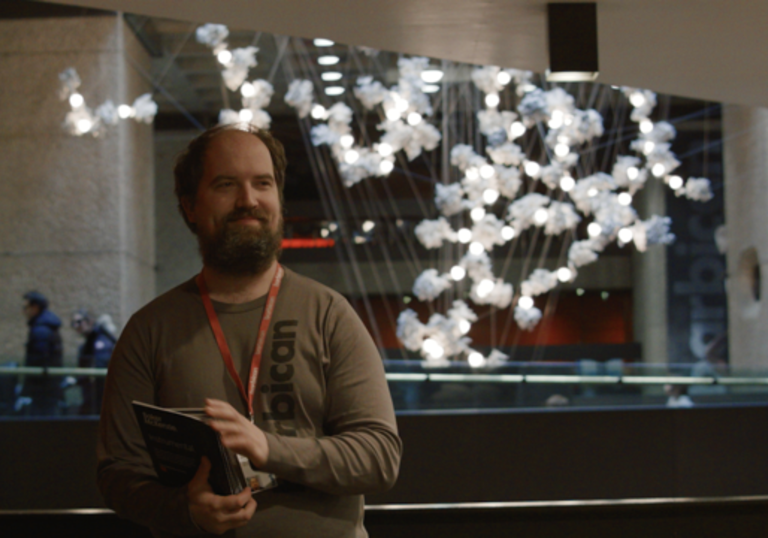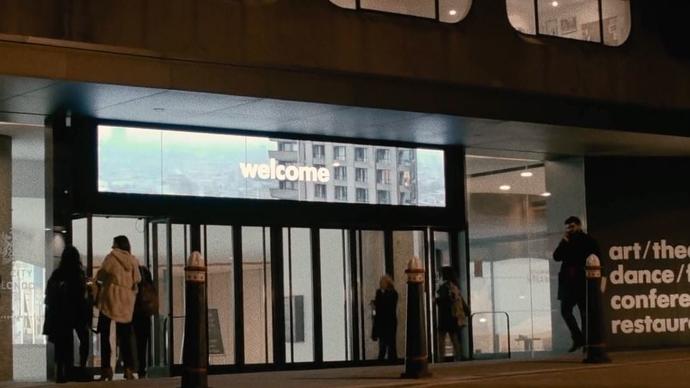As part of our 35th anniversary celebrations, we are premiering a short film, commissioned to celebrate a day in the Barbican, as seen through our Barbican Hosts.
To tell this story, we commissioned writer, performer and host, Paul Haworth to write a poem to mark the occasion. We also invited several Barbican hosts to star in the resulting short film.
But what does a typical day for a Barbican host look like? We caught up with Paul to find out more about working at the Barbican.
About Paul
‘When I am not at the Barbican, I am a writer and performer. I have written three novels, the ‘Silk Handkerchiefs’ trilogy, and co-wrote ‘Letter to Robin Kinross’ with Sam de Groot. With Sam I also made an album, ‘Illegal Emotions’, which included the popular songs ‘Poverty Failure Rejection’ and ‘British Values’. I am currently preparing a play, ‘Guide Me O Thou Great Redeemer’, which will premiere in May 2017 at Camden People’s Theatre.’
How long have you been working at the Barbican?
I joined in February 2013, first working in the Art Gallery during the The Bride and the Bachelors: Duchamp with Cage, Cunningham, Rauschenberg and Johns exhibition. After that finished, I trained as a Host and have been working through the Centre ever since.
Talk us through your average working day
A day can start at 7.45am, if working on a graduation ceremony, and finish after midnight, if working on a wedding in the Conservatory. More regular shifts are in the venues (cinema, hall, theatre) during shows.
Some of the best conversations I have about theatre are with colleagues at the Barbican
What is the best part of your job?
Getting to see art is the obvious perk. But what makes it so enjoyable as a workplace are the Barbican Hosts. We have some amazingly talented people working as Hosts: I salute all people who manage to work, study, pay rent in London AND make art. Some of the best conversations I have about theatre are with colleagues at the Barbican. I wrote an essay ‘Deeply Emotional’, about theatre and performance in London, which had the dedication: To my cloakroom colleagues who talk about art.
What is the most challenging part of your job?
Always a pleasure, never a challenge.
Do you have a favourite spot in the Barbican Centre or Estate?
The library. These days – with libraries closing, under-funded, amalgamated with random services into chaotic hubs – it is a joy to use a well-maintained, brilliantly staffed library with excellent stock. When I’ve got a few minutes before a shift, I will pop in to read a poem or two.
What was the first performance or exhibition you saw at the Barbican?
The first exhibition in the Art Gallery was Seduced: Art and Sex from Antiquity to Now in 2007. The first performance I saw was Lambchop in 2012, a year before I started working here. Lambchop are Barbican regulars so I have seen them a few times now.
What is your best Barbican memory or experience?
I have found this question the hardest to answer. There have been many good times, experiences big and small. But thinking over some of the shows I have seen, I will pick Zorn@60, John Zorn’s birthday celebration in the Hall in 2013. It was one of those shows that the Barbican is good at – ambitious nights with lots of changes on stage (rock bands, jazz ensembles, string quartets) that are a bit messy and overlong but also the kind of fantastical, spirited shows you so rarely see. It was great to see Mike Patton screaming on stage and when John Zorn finally dusted off his saxophone it all came to a gloriously noisy finish.
Outside the Barbican, what is your favourite thing to do in London?
Breakfast at the Regency Café in Pimlico.
A standing ovation at the end of the night is a glorious moment but all the other stuff that goes around it interests me…’
What prompted you to write your poem, Welcome?
Siddharth Khajuria, Senior Producer at the Barbican, invited me to write a poem about the Barbican as seen by a host. The challenge with such an invitation is to avoid something with the ‘Who cares?’ vibe about it – something that would have no reason to connect beyond employees of the Barbican. My interest in writing then was to evoke the human effort that makes it work – cleaning, catering, security, engineering. A standing ovation at the end of the night is a glorious moment but all the other stuff that goes around it interests me. I suppose I wanted to talk about the moments in the Barbican that are less represented but just as heroic as its towers or performers on stage.
Your poetry was also featured in the Barbican short, Skydweller – what is it about architecture and the city that inspires your work?
Whenever one looks at great cities from high up, it is a beautiful and threatening proposition. Watching the footage the Barbican had shot from the top of one of the towers, I was fascinated by how wild London appeared. It feels like an entirely economic landscape and yet there is still so much romance in it. Up in the sky, you are always imagining what is going on down there.
How does it feel seeing the words of your poem brought to life through the accompanying film?
Sometimes I am controlling about a work but from the outset this was a collaboration. It was fun to do my bit and then see where it goes – to let the musician, Tom Rosenthal, respond in music and the filmmaker, Ben Marshall, respond in film.
Describe the Barbican in five words.
Born in 1982 like me.


